Lasswell Harold D. The Political Writings of Harold D. Lasswell
Подождите немного. Документ загружается.

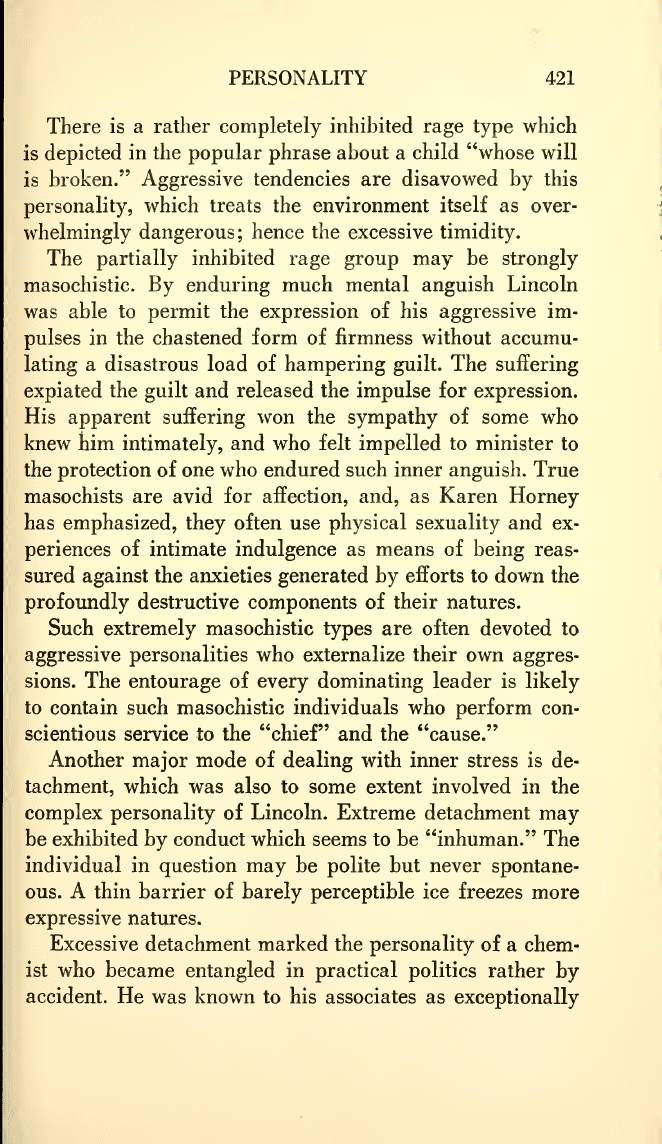
PERSONALITY 421
There
is a
rather completely inhibited rage
type
which
is
depicted
in the popular phrase about
a
child "whose
will
is
broken."
Aggressive tendencies are disavowed by this
personality,
which treats the environment
itself
as over-
whelmingly
dangerous; hence the excessive timidity.
The
partially inhibited rage
group
may be
strongly
masochistic.
By enduring
much
mental anguish Lincoln
was
able to permit the
expression
of his
aggressive
im-
pulses in
the
chastened
form of firmness without accumu-
lating
a
disastrous load of
hampering
guilt. The
suffering
expiated the guilt
and
released the impulse for expression.
His apparent suffering won the sympathy of some
who
knew him intimately, and who felt impelled to minister
to
the protection of one who
endured such inner anguish.
True
masochists are avid
for affection, and,
as
Karen
Horney
has
emphasized,
they often use
physical sexuality
and ex-
periences of intimate indulgence as
means
of being reas-
sured against
the
anxieties generated by efforts to
down the
profoundly destructive components of
their
natures.
Such
extremely masochistic types are often devoted
to
aggressive personalities who externalize
their
own
aggres-
sions.
The entourage of
every dominating
leader is likely
to
contain such masochistic individuals who perform
con-
scientious service
to
the "chief" and the
"cause."
Another
major
mode of dealing
with
inner stress
is
de-
tachment,
which was also to some extent involved in the
complex personality
of
Lincoln. Extreme detachment
may
be exhibited
by conduct
which
seems to be "inhuman."
The
individual in question may
be polite
but never
spontane-
ous. A thin barrier
of barely perceptible ice freezes
more
expressive natures.
Excessive detachment marked
the
personality
of
a chem-
ist
who became entangled in practical politics
rather
by
accident.
He was known to his associates
as exceptionally
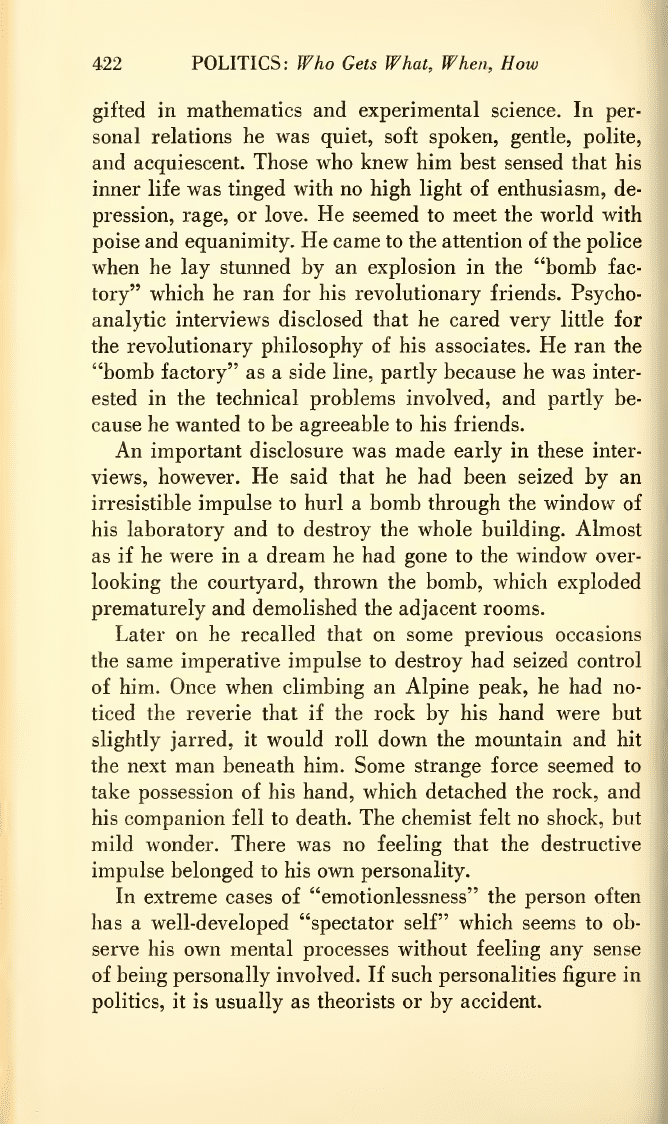
422
POLITICS: Who Gets What,
When,
How
gifted in mathematics
and experimental
science. In
per-
sonal relations he
was quiet, soft spoken, gentle,
polite,
and
acquiescent. Those who knew him best sensed that his
inner
life
was tinged
with
no
high
light of enthusiasm,
de-
pression, rage,
or love. He seemed
to
meet the world with
poise and
equanimity. He came to the attention of the police
when
he
lay
stunned by an
explosion
in the "bomb fac-
tory"
which he
ran
for
his revolutionary friends.
Psycho-
analytic interviews
disclosed that
he
cared very little
for
the
revolutionary philosophy of his associates.
He
ran
the
"bomb
factory" as
a
side line, partly because he was inter-
ested in the technical problems involved, and
partly
be-
cause he wanted to be
agreeable
to his friends.
An important disclosure was made early in these
inter-
views, however.
He said that
he
had
been
seized
by an
irresistible impulse to
hurl
a
bomb through the
window of
his
laboratory
and to
destroy the whole building. Almost
as if he
were
in a
dream
he had
gone to the window over-
looking
the
courtyard, thrown the bomb, which exploded
prematurely
and
demolished
the
adjacent rooms.
Later on he recalled that on some previous occasions
the same imperative
impulse
to
destroy
had
seized control
of
him. Once
when
climbing an Alpine peak, he had no-
ticed the reverie that if the rock
by
his hand were but
slightly jarred, it would roll down the mountain and hit
the next man beneath him. Some
strange force seemed
to
take possession of his hand, which
detached the rock, and
his
companion
fell to death. The
chemist felt no shock, but
mild wonder. There
was
no feeling that the destructive
impulse belonged to his own personality.
In
extreme cases of "emotionlessness" the
person often
has
a well-developed "spectator
self" which seems
to
ob-
serve his own mental processes without feeling any
sense
of being personally involved. If such
personalities figure
in
politics,
it is usually as theorists
or
by
accident.
kij
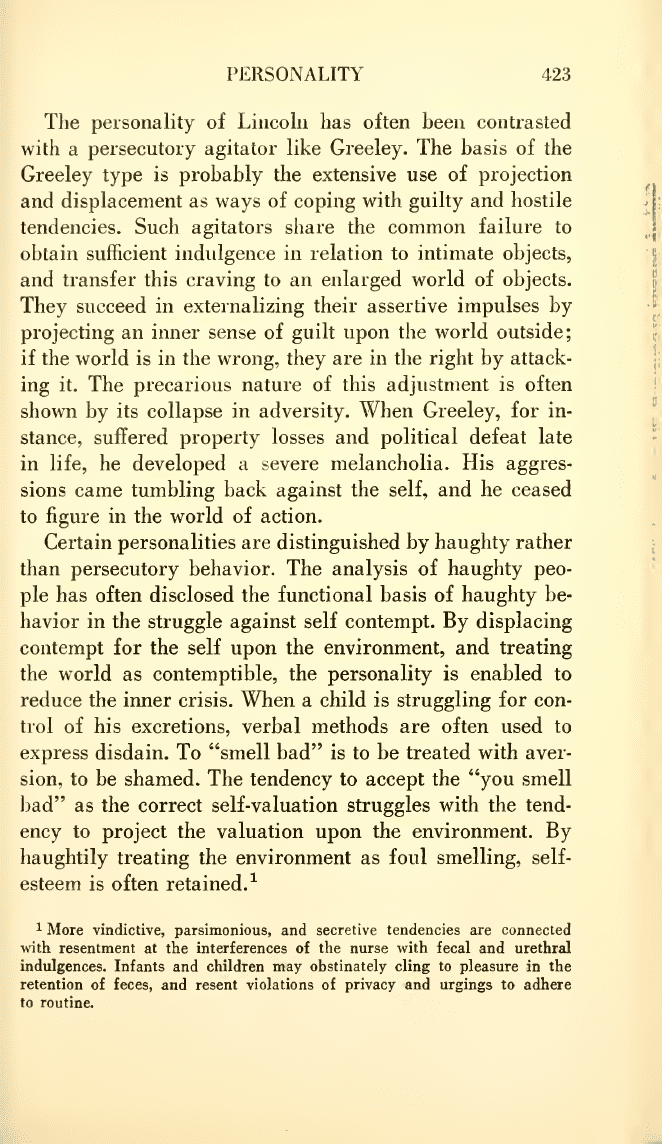
PERSONALITY 423
The
personality of Lincoln has often been
contrasted
with
a
persecutory
agitator
like Greeley.
The basis of
the
Greeley type
is probably the extensive use
of projection
and
displacement as ways of coping
with guilty and hostile
tendencies. Such
agitators
share the
common
failure
to
obtain sufficient indulgence in relation to
intimate objects,
and transfer this craving to
an enlarged world of objects.
They
succeed
in
externalizing their assertive impulses by
projecting an imier sense of
guilt upon the
world
outside;
if the world is in the wrong,
they are in the right by attack-
ing it. The precarious
nature of this adjustment is often
shown
by
its collapse in
adversity. When Greeley, for in-
stance, suffered
property losses and political defeat late
in life, he developed a
severe melancholia. His aggres-
sions came tumbling
back against the self, and he ceased
to figure in the world of action.
Certain personalities
are
distinguished by
haughty rather
than persecutory
behavior.
The analysis of
haughty
peo-
ple
has often
disclosed the functional basis of haughty
be-
havior in the struggle against self contempt.
By
displacing
contempt for
the
self
upon
the environment, and
treating
the world
as
contemptible, the personality is enabled to
reduce the inner crisis. When
a
child is
struggling for
con-
trol
of his excretions, verbal methods are often used to
express
disdain.
To
"smell bad" is to be
treated with aver-
sion,
to be shamed. The tendency to accept
the
"you
smell
bad" as the correct self-valuation struggles with
the
tend-
ency to
project the valuation upon the
environment. By
haughtily
treating the environment as foul
smelling, self-
esteem
is often
retained.^
1
More
vindictive, parsimonious,
and
secretive tendencies are connected
with
resentment at the interferences
of
the nurse
with
fecal
and
urethral
indulgences.
Infants
and
children may
obstinately cling to
pleasure in the
retention
of feces, and resent
violations
of
privacy and urgings
to adhere
to
routine.
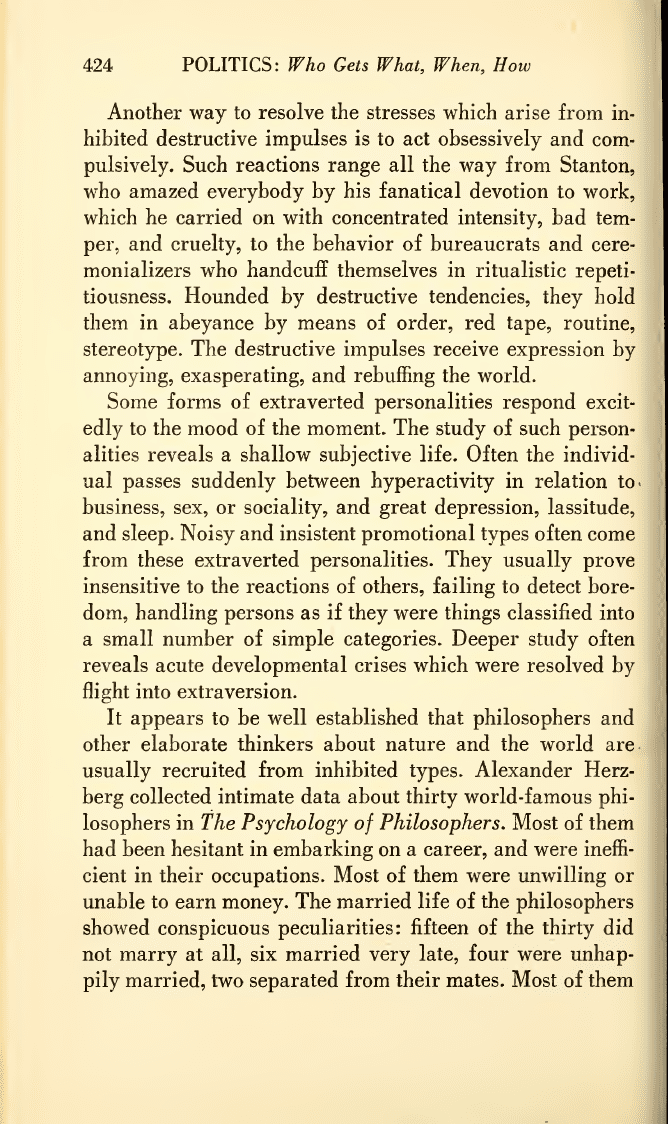
424
POLITICS: Who
Gets
What, When, How
Another way to
resolve the
stresses which arise from
in-
hibited destructive
impulses is
to act obsessively and
com-
pulsively. Such
reactions range
all the way from
Stanton,
who amazed
everybody
by
his
fanatical devotion
to work,
which he
carried on with
concentrated intensity,
bad tem-
per, and cruelty, to
the
behavior of bureaucrats and
cere-
monializers who
handcuff
themselves in ritualistic
repeti-
tiousness. Hounded by destructive tendencies,
they hold
them in abeyance by means of order, red tape,
routine,
stereotype. The destructive impulses receive expression
by
annoying, exasperating, and rebuffing the
world.
Some forms of extraverted personalities
respond excit-
edly to the mood of the moment. The study of
such person-
alities reveals
a
shallow subjective life. Often
the individ-
ual
passes suddenly between hyperactivity
in relation to
business, sex,
or
sociality, and great depression,
lassitude,
and sleep. Noisy and insistent promotional types often
come
from these extraverted personalities. They usually
prove
insensitive to the reactions of others, failing
to detect bore-
dom, handling persons
as if
they were things
classified into
a
small number of
simple categories. Deeper study
often
reveals acute developmental crises which were resolved
by
flight into extraversion.
It appears
to be
well established that philosophers and
other elaborate thinkers about
nature
and the world are
usually recruited from
inhibited
types. Alexander Herz-
berg collected intimate data about thirty world-famous phi-
losophers in The Psychology
of
Philosophers. Most of them
had
been hesitant in embarking on a
career,
and
were ineffi-
cient in their occupations.
Most
of
them were unwilling
or
unable to earn money. The
married life
of
the philosophers
showed conspicuous
peculiarities: fifteen
of
the thirty
did
not
marry
at
all, six married very late, four were unhap-
pily married,
two
separated from
their
mates.
Most
of them
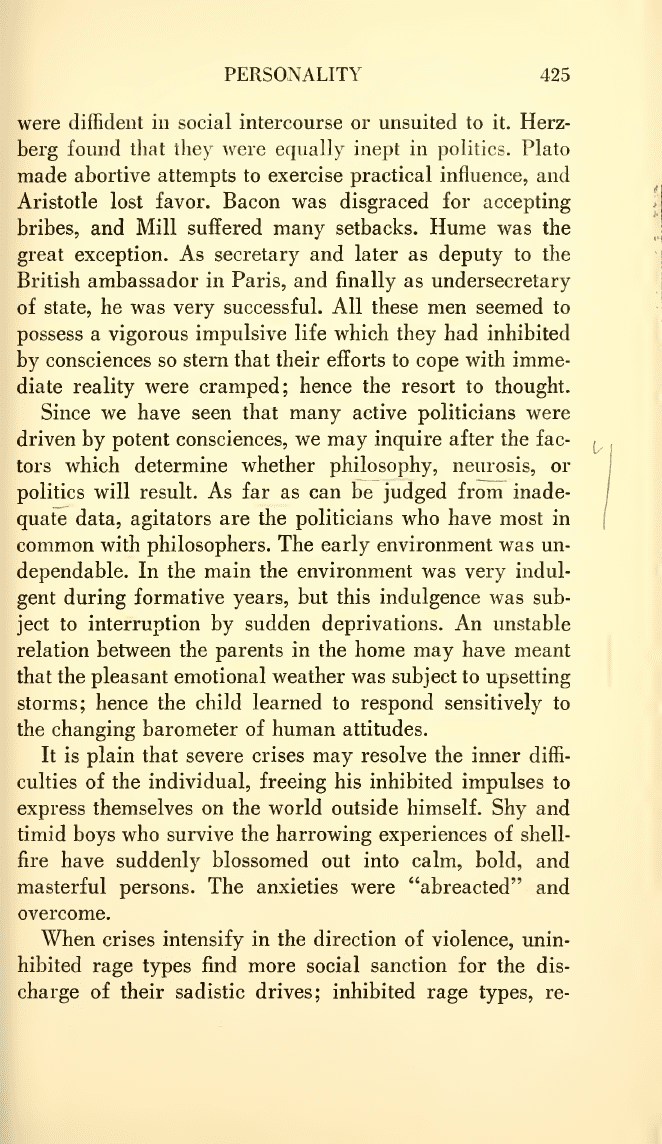
PERSONALITY
425
were
diffident in social intercourse or unsuited to
it.
Herz-
berg
found
that they were equally inept in
politics.
Plato
made
abortive attempts to exercise
practical influence,
and
Aristotle lost favor. Bacon was disgraced
for
accepting
bribes, and
Mill suffered many setbacks. Hume
was the
great exception. As
secretary
and
later
as deputy
to the
British ambassador in
Paris,
and finally as undersecretary
of state, he was
very successful. All these men
seemed to
possess
a
vigorous
impulsive life which they
had inhibited
by
consciences
so
stem that their
efforts
to cope with imme-
diate reality were
cramped; hence the resort to thought.
Since we have seen
that many
active politicians were
driven
by
potent consciences, we may inquire after the fac-
tors which
determine whether philosophy, neurosis, or
politics will result.
As
far as
can
be judged
from
inade-
quate data, agitators are the
politicians
who have most in
common
with philosophers. The early environment was un-
dependable. In the
main the environment was
very
indul-
gent during formative
years, but this indulgence
was sub-
ject
to interruption by sudden deprivations. An unstable
relation between the
parents in the home may have meant
that the pleasant
emotional weather was
subject to upsetting
storms; hence the
child learned
to
respond
sensitively to
the changing barometer
of human attitudes.
It is plain that severe
crises may
resolve the inner diffi-
culties of the individual,
freeing
his inhibited impulses
to
express themselves
on
the world outside himself. Shy
and
timid
boys
who survive the
harrowing
experiences of
shell-
fire
have suddenly
blossomed
out into
calm,
bold,
and
masterful
persons. The anxieties were "abreacted"
and
overcome.
When
crises
intensify in the direction
of violence,
unin-
hibited
rage types find
more
social
sanction
for
the dis-
charge
of their
sadistic drives; inhibited rage
types,
re-
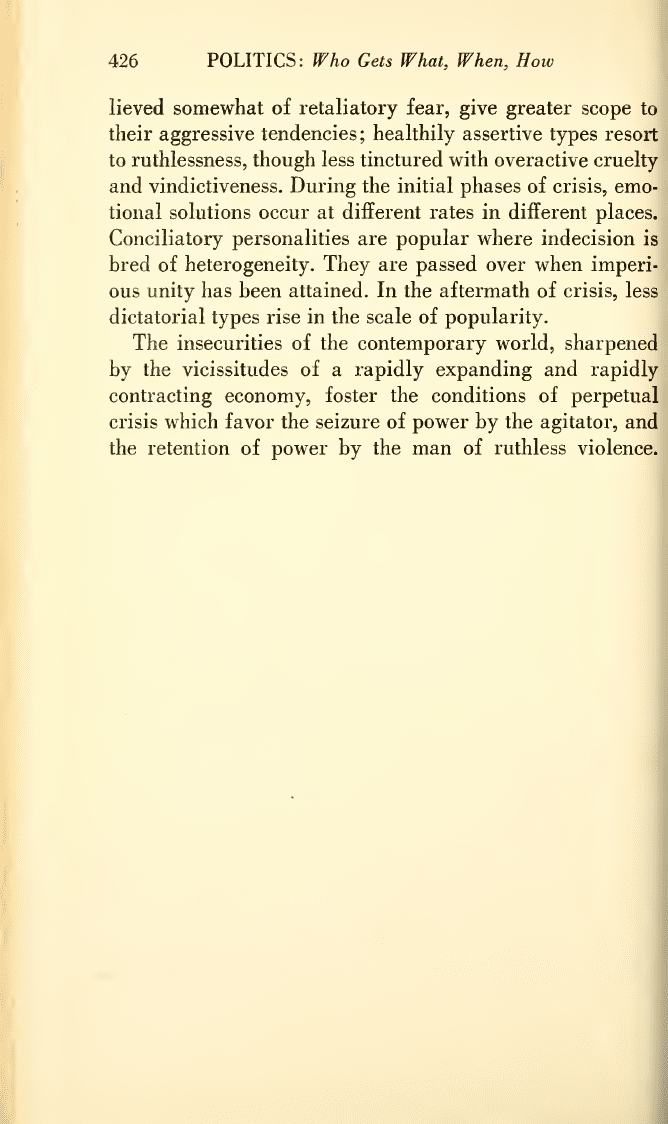
426
POLITICS:
Who Gets What, When, How
lieved somewhat
of retaliatory fear,
give greater scope
to
their aggressive
tendencies; healthily assertive
types
resort
to
ruthlessness, though less tinctured with
overactive cruelty
and vindictiveness.
During
the
initial
phases of crisis,
emo-
tional solutions
occur at different rates
in
different
places.
Conciliatory personalities are popular where indecision
is
bred
of
heterogeneity. They are passed over when imperi-
ous unity has been
attained.
In the
aftermath
of
crisis,
less
dictatorial types rise
in the scale
of
popularity.
The
insecurities of the contemporary world, sharpened
by
the vicissitudes of
a
rapidly expanding and rapidly
contracting economy, foster the conditions of perpetual
crisis which favor
the
seizure of power by the
agitator,
and
the retention of power by the man of
ruthless
violence.
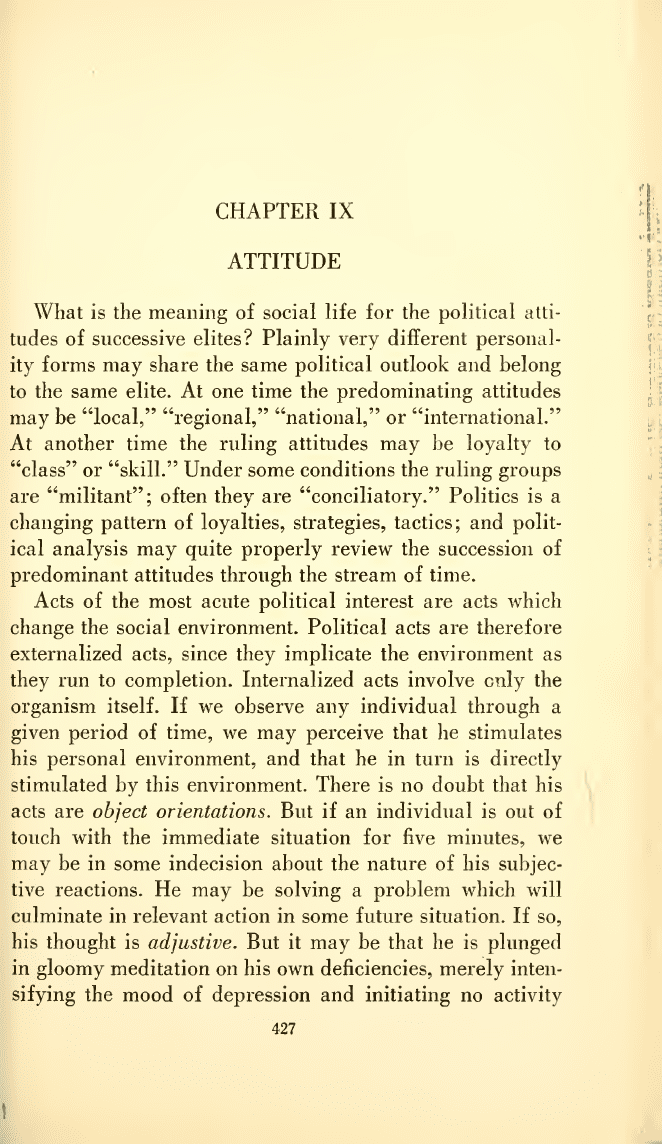
CHAPTER IX
ATTITUDE
What is the meaning of social life for the
political atti-
tudes of successive elites?
Plainly
very
different personal-
ity
forms
may
share the same political outlook and belong
to the same
elite.
At
one time the predominating attitudes
may be
"local," "regional," "national," or "international."
At
another time the ruling attitudes may be loyalty to
"class" or "skill." Under
some
conditions the ruling groups
are "militant"; often they are "conciliatory." Politics is
a
changing pattern
of
loyalties, strategies, tactics; and polit-
ical analysis may
quite
properly review the succession of
predominant attitudes through the stream
of
time.
Acts
of the most
acute political interest are acts which
change
the
social environment. Political
acts are
therefore
externalized acts, since they implicate
the
environment
as
they run to completion. Internalized acts involve only the
organism itself. If we observe any individual through
a
given period of time, we may perceive
that
he stimulates
his
personal environment, and that he in turn is directly
stimulated
by
this
environment. There is no doubt that his
acts are
object
orientations.
But if an individual is out of
touch with the immediate
situation for
five minutes,
we
may
be
in
some
indecision
about the
nature
of
his
subjec-
tive
reactions. He may
be
solving
a
problem which
will
culminate
in relevant action in some future situation.
If so,
his thought
is
adjustive.
But it may
be
that he is plunged
in gloomy
meditation on
his
own
deficiencies, merely
inten-
sifying the
mood of depression
and initiating
no activity
427
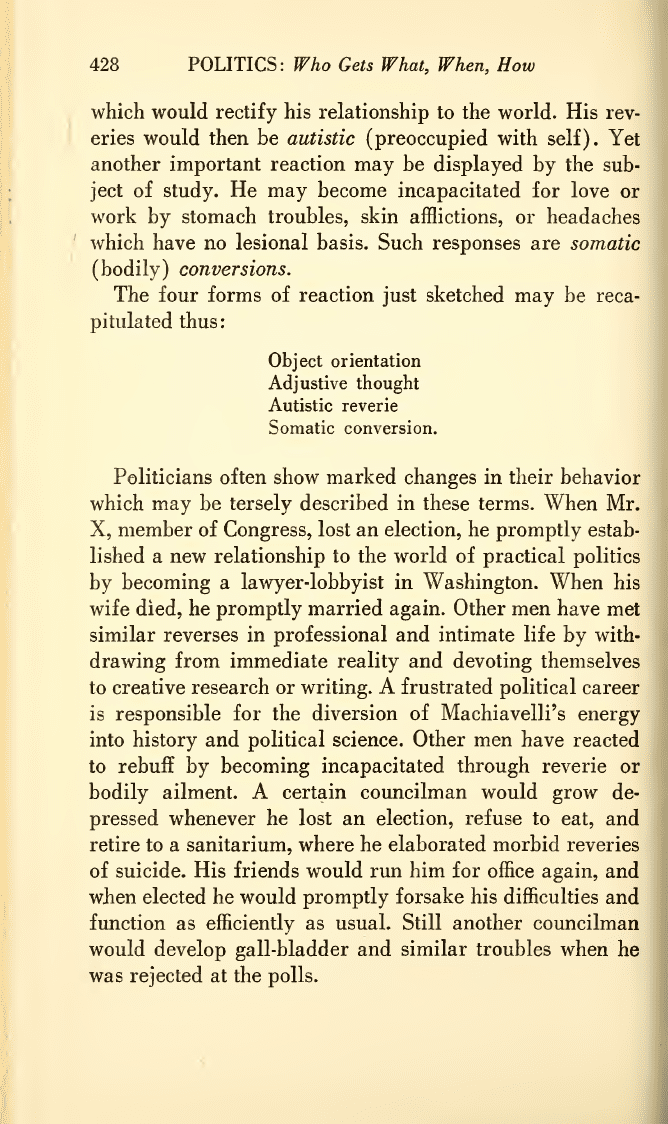
428 POLITICS: Who Gets What,
When, How
which would rectify his relationship
to the world. His
rev-
eries would then be autistic (preoccupied with
self).
Yet
another important reaction
may be displayed
by the sub-
ject of
study.
He may become
incapacitated for love
or
work by stomach
troubles, skin
afflictions,
or headaches
which have no lesional
basis.
Such responses are
somatic
(bodily) conversions.
The four forms of reaction
just
sketched
may be
reca-
pitulated thus:
Object orientation
Adjustive thought
Autistic reverie
Somatic conversion.
Politicians often show
marked
changes in their behavior
which may be tersely described in these terms. When
Mr.
X, member
of
Congress, lost an election, he promptly
estab-
lished
a
new relationship to the world of practical politics
by
becoming
a
lawyer-lobbyist in Washington. When
his
wife died,
he
promptly married again. Other men have
met
similar reverses in professional and intimate life
by
with-
drawing from immediate
reality
and devoting themselves
to creative research or
writing. A frustrated political
career
is responsible for the
diversion of Machiavelli's
energy
into history and political science.
Other men
have reacted
to
rebuff
by
becoming incapacitated through reverie
or
bodily
ailment.
A
certain councilman would grow
de-
pressed whenever he lost an election,
refuse
to eat,
and
retire
to a
sanitarium, where he
elaborated morbid
reveries
of suicide.
His friends would run him for office again,
and
when
elected
he
would promptly forsake his difficulties
and
function
as
efficiently as usual.
Still another
councilman
would develop gall-bladder
and similar troubles
when
he
was
rejected
at the
polls.
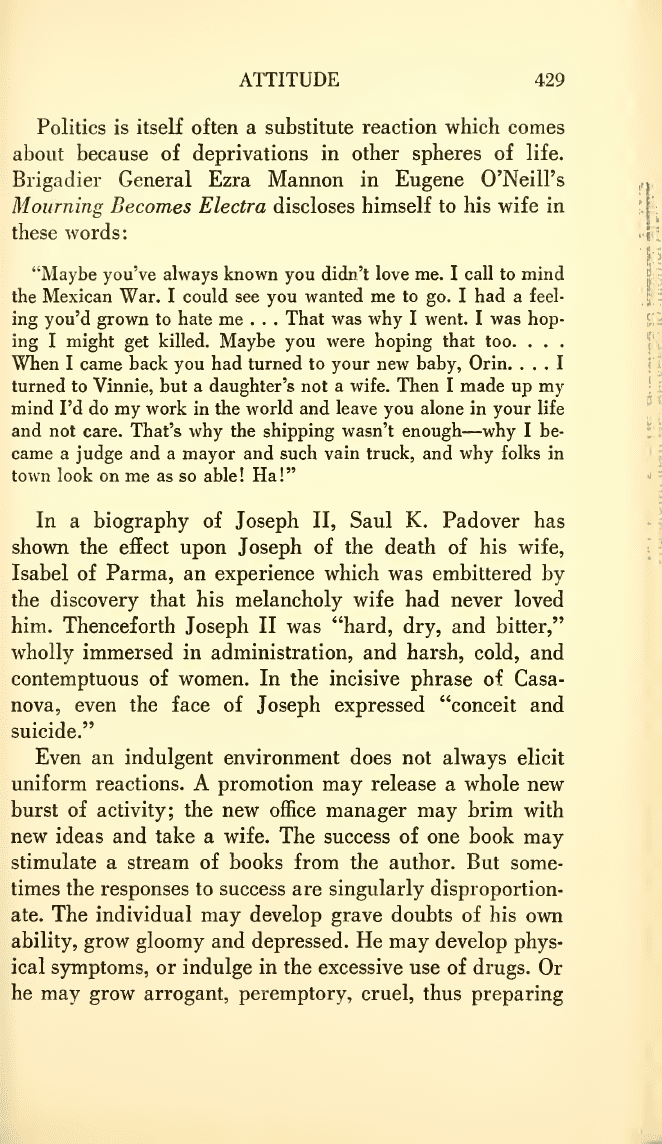
ATTITUDE 429
Politics is
itseK often
a
substitute
reaction which comes
about
because of deprivations in
other spheres of life.
Brigadier General Ezra Mannon in
Eugene O'Neill's
Mourning Becomes Electra discloses himself to
his wife in
these words:
"Maybe you've
always known
you didn't
love me. I call to mind
the
Mexican
War. I could see you
wanted me to
go.
I
had a
feel-
ing
you'd
grown
to
hate me . . . That was why I
went.
I was hop-
ing
I
might
get
killed.
Maybe
you were hoping that too. . .
.
When I came back you had
turned to your
new
baby, Orin.
...
I
turned to Vinnie, but a
daughter's
not a
wife. Then
I made up my
mind I'd
do
my work
in
the world and leave you
alone
in your life
and not
care. That's why the
shipping wasn't enough
—
why I
be-
came
a judge and a mayor and such
vain truck,
and why
folks
in
town
look on
me
as
so able! Ha!"
In
a
biography
of
Joseph
II,
Saul
K. Padover has
shown the
effect
upon
Joseph
of the
death
of
his wife,
Isabel of
Parma,
an
experience
which was
embittered
by
the discovery that his melancholy wife had never
loved
him.
Thenceforth
Joseph
II was "hard, dry, and bitter,"
wholly
immersed in administration, and harsh,
cold, and
contemptuous of women. In the incisive phrase
of Casa-
nova, even the face of
Joseph
expressed "conceit
and
suicide."
Even an
indulgent
environment does not always
elicit
luiiform reactions.
A promotion may release
a
whole
new
burst of
activity; the new office
manager may brim
with
new
ideas
and take
a
wife.
The success of one book
may
stimulate a stream of books from the author. But
some-
times the responses to success
are
singularly
disproportion-
ate.
The individual may develop grave doubts of his
own
ability, grow gloomy and depressed. He may
develop
phys-
ical
symptoms, or indulge in the excessive use
of drugs.
Or
he may
grow arrogant,
peremptory,
cruel, thus
preparing
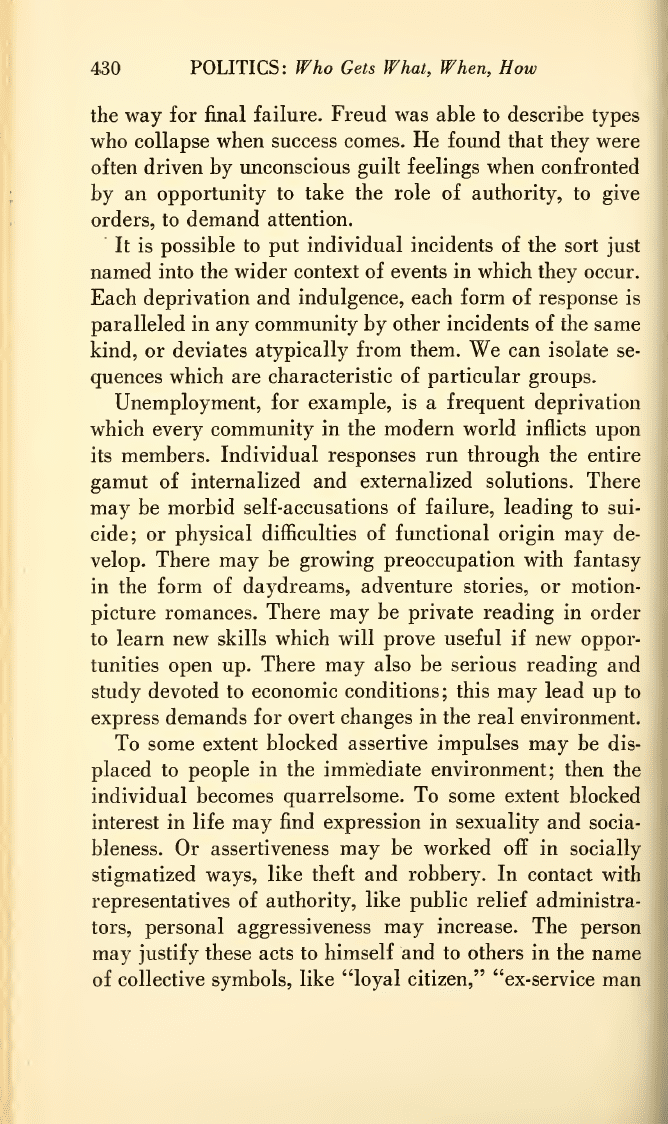
430
POLITICS:
Who Gets What, When,
How
the way
for
final failure.
Freud was
able to describe
types
who collapse
when
success comes.
He
found that they
were
often driven by
unconscious guilt feelings when confronted
by
an
opportunity to
take the role of authority,
to give
orders, to demand
attention.
It is
possible to put
individual incidents
of the sort
just
named
into the wider
context of events in which they
occur.
Each
deprivation and
indulgence, each form of response
is
paralleled in any
community by other
incidents
of the same
kind, or
deviates atypically
from them.
We can isolate
se-
quences
which
are
characteristic of particular groups.
Unemployment,
for example, is
a
frequent deprivation
which
every
community
in
the modern world inflicts
upon
its
members.
Individual responses run through the entire
gamut of
internalized and
externalized
solutions. There
may be
morbid self-accusations of
failure,
leading
to
sui-
cide; or
physical difficulties
of functional
origin may
de-
velop.
There may be
growing preoccupation
with fantasy
in the
form of
daydreams, adventure stories,
or motion-
picture romances.
There may be private reading
in order
to
learn new skills
which will prove useful if
new oppor-
tunities open
up.
There may also be serious
reading and
study devoted to
economic
conditions; this
may
lead up to
express demands
for overt
changes in the
real environment.
To some
extent
blocked assertive impulses
may
be dis-
placed
to
people in the
immiediate environment;
then
the
individual
becomes
quarrelsome. To some extent
blocked
interest in
life
may
find expression in
sexuality
and socia-
bleness. Or
assertiveness may be
worked off
in socially
stigmatized
ways,
like
theft and robbery. In
contact with
representatives of
authority, like public relief
administra-
tors, personal
aggressiveness may
increase.
The
person
may
justify
these
acts to
himself and to others
in the name
of
collective symbols, like
"loyal citizen," "ex-service
man
ii\
